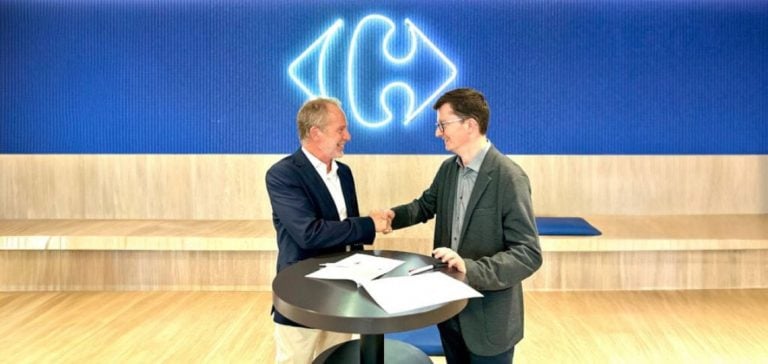Carrefour is pursuing its strategy of reducing its carbon footprint with the signing of a power purchase agreement (PPA) with Qair, a player specializing in renewable energies.
The contract aims to supply Carrefour Italia with solar energy, with a planned annual production of 75 GWh.
The new solar power plant, with a capacity of over 52 MWp, will be located in the Lazio region and is scheduled to be operational by 2026.
This initiative is in line with Carrefour’s decarbonization objectives, which aim to reduce its emissions by 50% by 2030.
The group also plans to cover all its electricity consumption with renewable sources by the same deadline.
With this partnership, Carrefour reinforces its energy management strategy, while aligning its actions with European regulations encouraging a transition to cleaner energies.
Cooperating to secure energy supplies
Qair, a key partner in this initiative, is positioned as a strategic supplier for this major project.
The company is already well established in Italy, where it is developing several green energy projects.
This contract, which marks a major step forward for Carrefour, will enable its Italian network to benefit from a local and sustainable supply of electricity.
For Carrefour, this contract offers the possibility of securing its energy supply while meeting the requirements of its customers and investors, who are increasingly sensitive to the decarbonization of the supply chain.
For its part, Qair is strengthening its position in the Italian market, which is particularly dynamic in the development of renewable energies.
The agreement provides for delivery over 20 years, with a volume corresponding to the supply of 30 Carrefour hypermarkets in Italy.
Carrefour: a global plan for decarbonization
Signing this PPA is not an isolated act for Carrefour.
It is part of a wider strategy to transform its energy model.
The group, which operates in several countries, is counting on the multiplication of local partnerships to gradually reduce its reliance on fossil fuels.
In addition, Carrefour is imposing increasing demands on its main suppliers, asking them to adopt a climate trajectory in line with the Paris Agreement.
By 2026, 100% of tier 1 suppliers must have committed to a decarbonization trajectory in line with the 1.5°C target.
Those who fail to meet these criteria risk being dereferenced.
This strategic framework shows that Carrefour is seeking to use its influence to accelerate the adoption of sustainable practices across its entire value chain, which includes both internal energy management and cooperation with players such as Qair.
Impact of the PPA on the Italian energy market
Italy, one of Carrefour’s target markets, sees this type of initiative as an opportunity to strengthen its renewable energy mix.
The country recently adopted reforms to encourage long-term power purchase agreements, in order to stabilize its energy market.
The partnership with Qair will enable additional solar energy capacity to be injected into the Italian power grid, supporting the national objective of increasing the share of renewable energies to 30% by 2030.
By collaborating with Qair, Carrefour is indirectly contributing to Italy’s energy dynamic, by participating in the local production of clean energy.
This project could also serve as a model for other multinationals seeking to secure their renewable energy supplies over the long term.
Towards a more robust energy risk management model
Power Purchase Agreements (PPAs) have become a strategic lever for companies wishing to stabilize their energy costs while reducing their environmental footprint.
For Carrefour, the PPA signed with Qair not only guarantees a supply of solar energy for its Italian network, but also protects its activities against fluctuations in energy prices.
By stabilizing its energy budget over the long term, Carrefour avoids the vagaries of short-term markets, which are particularly volatile in times of energy crisis.
This risk management strategy enables the Group to better anticipate the costs associated with its operations, while guaranteeing continuity of supply.
Italy is a privileged market for the development of this type of contract, as the country has a regulatory framework favorable to the expansion of renewable energies.
Other major companies in the region could follow Carrefour’s example, accelerating the country’s energy transition.






















